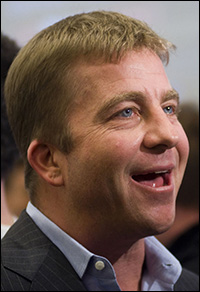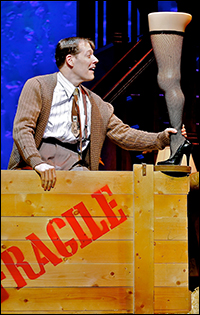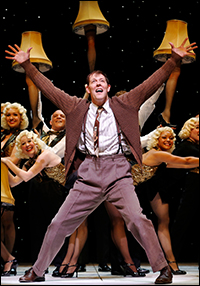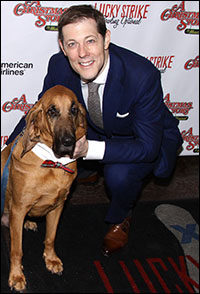
*
John Bolton, whose Broadway outings include the original companies of Curtains, Monty Python's Spamalot, Contact and Titanic, feels like he won "A Major Award" with the new musical A Christmas Story. The actor, a devoted fan to the 1983 film of the same name, originated the role of The Old Man in the world premiere of A Christmas Story when the musical show bowed (in an earlier version) at the Kansas City Repertory Theatre in 2009. Following an extended engagement in Missouri, the work resurfaced in 2010 at Seattle's 5th Avenue Theatre with Bolton back as its leading man and rising songwriters Benj Pasek and Justin Paul (Edges, Dogfight) newly attached.
Bolton also embarked on the show's five-city tour in 2011, but when talk of Broadway filled the air, Bolton didn't jump for joy — as The Old Man does in the musical — until he was confirmed to reprise his regional performance. Now, A Christmas Story, The Musical plays Broadway's Lunt-Fontanne Theatre for a holiday engagement, and Bolton is the only cast member who has been attached to the show from its beginning.
In your bio in the Playbill, you give a shout out to your "Old Man extraordinaire." Was your relationship with your father similar to the Old Man-Ralphie dynamic we see in A Christmas Story?
JB: Not really. The gentlemen and the fathers in [the 1940s] weren't nearly as demonstrative as the fathers that, I think, we grew up with. My dad was a very warm, caring guy who was always there, worked hard and got frustrated like any dad gets frustrated about any little thing. With my dad, I think it was our aerial antenna that he would get frustrated with — much like the furnace in [A Christmas Story]. I took little things [from him], like the way I rub my eyes in the show. There's a couple line readings I swear I could just hear my dad do, but I think, overall, I'm just grateful that I still have my dad. And, the fact that I get to play such an iconic father, of course, makes me think of my own.
It really is a father-son tale. What did you explore in rehearsals with Johnny Rabe and Zac Ballard, who play your sons Ralphie and Randy, [respectively], in the show?
JB: You know, I learn from them every day. I know that sounds crazy, but it's so true, particularly when they are, as they are usually, very natural — just relaxing and enjoying the ride of the show. It's great to take a page from what they're doing because they approach it as kids — from a really innocent, blank-slate of a place. And, I think it's a healthy thing for any actor to examine that instead of [thinking], "I'm going to spin it like this and that, and put a cherry on top of that." Kids don't really do that. It's been kind of inspiring to learn from them.
 |
||
| Peter Billingsley |
||
| Photo by Monica Simoes |
JB: He's an incredibly warm, wonderful, smart man, and he was a genuine leader in rehearsals when he was there… He's a busy man with a very large career in Los Angeles! And, of course, when it was time for [director John] Rando to take over, Peter graciously let Rando work his magic, which he did. But, with me, I would go to [Peter Billingsley] and say, "Is it all right?! Are you seeing what you need to see?" [Laughs.] And, he would sort of adjust the tone a tad, when I needed it, or confirmed the tone of what I was doing. I would say he helped the most with that, just reassuring me that I was on the right track and doing exactly what he saw the show needed. And, I appreciated that.
It's also been really cool meeting a lot of the other actors, over the years, who were in the film because, of course, I knew the film really well — since it came out. I remember seeing the film for the first time. I found a movie theatre with about six other people — a small movie theatre in Rochester, NY, and I [went] because I read the review. This was, of course, right when it first came out, and it wasn't the big hoo-ha that it is [now]. And, I remember talking for several years about this great little movie I saw that very few people knew, but once in a while, at a party or something, you'd find someone who knew this amazing film and could throw quotes around with you. It wasn't until the video craze — the surge — and it's presence on TBS that, all of a sudden, the whole world knew these quotes. While it was great that the whole world knew them, I felt like it was this special thing that only a few of us knew about for a few years.
Because of your attachment to the film, were you anxious or nervous to take on the role of The Old Man? It's precious material.
JB: Absolutely. I feel an enormous responsibility, particularly with this role. This is a beloved performance by a fantastic actor — Darren McGavin, of course — but the needs of the musical are different than the needs of the film. I'm 20 years younger than he was when he made the film, so I'm me. Although I hear his line readings in my head — and hopefully bring some of them out because I do admire that performance so greatly, and I don't want to stray too crazy far from it — I'm me. I have to let me bring myself to it with, hopefully, a tip of many hats to Mr. McGavin during the evening…if I do it right.
 |
||
| Bolton in A Christmas Story, The Musical. |
||
| photo by Carol Rosegg |
Then we went to Seattle's 5th Avenue [Theatre], which, of course, has had so many shows [transfer to] Broadway. And then they started saying the B-word a lot. I thought, "I'll enjoy this now, and they're probably going to put a TV star in my part — just be ready for it." Then the national tour came, and [the creative team said], "Oh, no… We wouldn't think of having anyone else," and I got to do it again, and I held my breath until June when I found out: Yes, it was going to be on Broadway, and, yes, they were going to use me. And, I haven't watched the film since then… There's one scene I checked in with last year when I felt like I was going astray — the broken Leg Lamp scene — but since getting this job, I have not watched the film.
 |
||
| Bolton and company perform "A Major Award." |
||
| Photo by Carol Rosegg |
JB: I began with the things I remembered the most. I don't want to say "Not a finger!" any other way than the way Darren McGavin says it, or his brilliant swear "Hasticklefiffer" — I don't want to say it any other way — or "Get the glue"! [or] "Do you know what your son just said?" I just sort of see him in my mind when I say these things, and I see him with great affection. Because I don't want to hear those lines said any other way, I don't think a lot of the audience does.
Now, the ones that I don't remember his exact line readings: maybe there are the film people out there who are going, "Oh! He blew that one," but I can't do the whole thing [as he did it]. I still have to be me. And, the writers, [librettist Joseph Robinette and composer-lyricists Benj Pasek and Justin Paul], have fleshed out a lot more of the story — the heart between Mom and Dad and the kids — so I figured if I just checked in with the things I remembered and didn't want changed, those are the ones I kept; anything else, I just ride the same ride [and use] the same intention.
At the end of your first-act number, "A Major Award," you get to have this big rock-star moment when you swoop up into your falsetto!
JB: [Laughs.] Guys in their 40s don't really get to do that, so I'm really excited! The number had an ending where we all hit this big note, and I thought, "No! You know what, I'm going to try in rehearsal letting the dad have the last word." So I swooped up to this crazy "John Bolton" note that I have in my back pocket for some crazy reason — I have no idea why — and they went, "Oh, my God, yes! Yes! You must do that every night." They even came to me and said, "Do you know what that note is? That's amazing." I said, "Don't tell me what the note is because if I know, I'll start seeing it on the [paper] way high over the staff." I just let it be more of a noise than a note — a noise on pitch! I think it's just a little last moment of, "Yeah!" I'm very grateful that they let me do it.
Besides the singing, you also do a fair amount of yelling throughout the show. How do you maintain good vocal health?
JB: I work with Liz Caplan, who is like the most amazing vocal coach in the city, so she's offered some wonderful advice. Every year I've done Christmas Story, I usually start with a full deck, vocally, and then… It's not the singing that gets me; it's the yelling. Knowing that I'm on Broadway this year, I don't want to watch my voice go down hill so that by the end of the show, I'm just barely squeaking it out. I knew I had to rethink a lot of how I approached, physically, yelling at the furnace and the dogs. I thought, "Well, all of those [lines] don't need to be screamed. Why not just say some of the words? Then, when you do yell, it'll mean something." So I did it that way. I cut the amount of yelling, believe it or not, in half, and I think the sound department knew that and has helped me by taking moments where I'm not yelling and making me sound like I'm yelling. Now, am I tired at the end of a show, vocally? Sure. Maybe it's not a good idea to go have three Manhattans [after the show], but I usually go home and have tea! [Laughs.] That sounds so truly "Old Man," but I'm looking forward to making up for those Manhattans when the show's over! [Laughs.]
 |
||
| John Bolton with Pete |
||
| Photo by Joseph Marzullo/WENN |
JB: I'm falling in love more and more every day with Pete and Lily… I've learned a lot about animal training, that's for sure. I have two dogs of my own, both of whom are very jealous when I come home. [Laughs.] I trained both my dogs, and I love dogs, so I felt like I had a good start. And, I've known Bill for 20 years. We've done several productions of Annie together, and I knew that he trusted me with these animals. [Pete and Lily] have different needs. Pete is affection-reward based, and Lily is food-reward based, and Pete is much shyer than Lily. With training them, you can't just get them on stage and give them a treat and shoo them away. I have to find a way to be terrified of the dogs and be angry at the dogs while giving them both what they need. I need to somehow translate frustration into affection for Pete and somehow slip Lily all the food she wants to keep her on stage, so that's been an interesting [task]. When I see them, instead of saying, "Who's a good boy?," our thing is, "Get outta here… Go on, get outta here" because that's what The Old Man shouts [in the show]. We had to make "Get outta here" affectionate, so now when I see them, I say, "Get outta here" so that it doesn't have a negative connotation. Bill is so patient and so good at his job, and it's truly and honestly an honor to get to work with him and fall in love with these animals.
You also teach at Pace University?
JB: I am an adjunct professor. I teach Acting at Pace University. I am not teaching now. Donna Drake is teaching my stuff right now, but I think next semester I'm going to have a couple classes if I'm not doing a show. Pace has been very patient with me. They know that I am a working actor. Teaching is something that has always really interested me, and the people who run the department sought me out and said, "Is there something you like to do? We have an opening here and we know that you do…" I do those Broadway classroom [workshops], and I often lead college workshops, and I always enjoy it. So I thought, "I'll dive in." Academia is a whole different world, but I love it. I learned as much as the kids did so far, and I'm looking forward to doing more.
What kind of advice do you give to aspiring actors?
JB: Hit your mark and tell the truth. I also say, "Do your homework." The toughest part of this business is getting the job, but I think if you do everything you can to make your best appearance and do your best — prepare… If you get an audition to work on, cancel your plans; work on your audition. If you're auditioning for someone's assistant, write their name down. That assistant is going to be a casting director someday. Keep track of what you're doing, and show up, and do your best. Because then, when you don't get the part, you know you did your best. It's not, "Oh, I blew it," and that's what can eat you alive. You're probably not going to get the job — that's how it is — but they'll remember you and bring you in for something else. And then you'll get the job.
(Playbill.com staff writer Michael Gioia's work appears in the news, feature and video sections of Playbill.com. Follow him on Twitter at @PlaybillMichael.)
Bolton trains with A Christmas Story's hounds, Pete and Lily:










